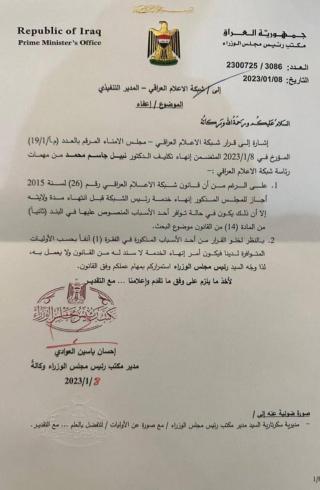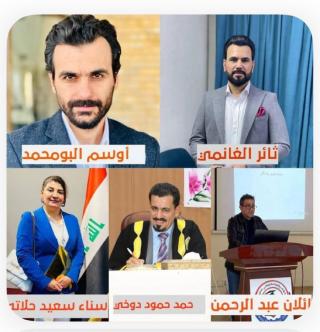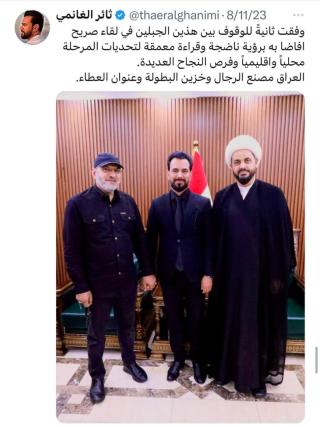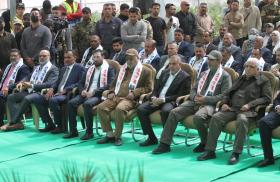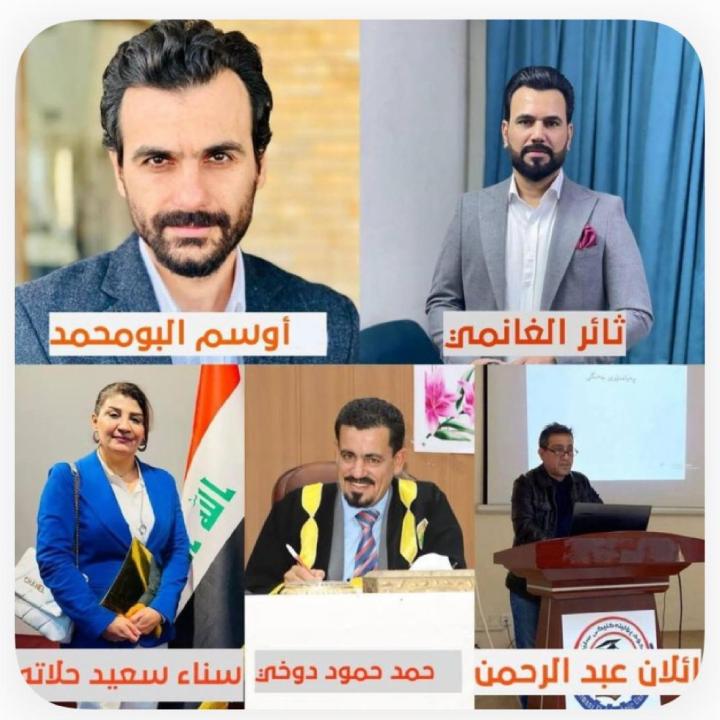
Profile: Iraqi Media Network

Part of a series: Militia Spotlight: Profiles
or see Part 1: How to Use Militia Spotlight: Profiles
The Iraqi Media Network is the latest so-called independent agency to fall under the control of U.S.-designated terrorist groups and human rights abusers, adding a new line of effort to "resistance" attacks on freedom of expression.
Name: Shabakat al-Elam al-Iraqi (Iraqi Media Network, or IMN)
Type of movement: One of Iraq’s so-called "independent agencies," with oversight over national media. Often furthers the propaganda aims and political interests of the muqawama (resistance) and the Coordination Framework (CF), who hold a majority on the agency's board.
Role: The IMN's official mission includes the following goals:
- Ensure professional standards in media work.
- Participate in developing free opinions, which will facilitate and encourage the citizens and the democratic process in all fields.
- Enforce patriotism and nationalism and its diversity and unity.
- Present news about current events in a style that emphasizes inclusiveness, no bias, and independence.
- Reflect the government's activities and events according to what the editor-in-chief decides.
- Encourage innovation and promote Iraqi cultural production.
- Disassociate from all cultural, religious, national, or political biases, staying at the same distance from everyone.
History and objectives:
- The IMN was established in May 2003 with a board of four trustees selected by the Coalition Provisional Authority. In 2004, the U.S. Defense Contracting Command paid Harris Corporation $96 million to upgrade the IMN. The contract included equipment, operations, training, and content.
- In January 2020, television presenter Nabil Jassim became president of the IMN.
- In 2021 and 2023, the Board of Trustees voted to remove Jassim, triggering a back-and-forth between the Court of Administrative Disputes (which tried to block the move) and Court of Cassation (which supported his removal).
- In January 2023, Prime Minister Mohammed Shia al-Sudani personally intervened to prevent Jassim’s removal. The Prime Minister’s Office stated that Jassim was being dismissed without cause and refuted the board’s ability to sack him: “Although the IMN law number (26) for the year 2015 authorized the board to terminate the service of the head of the network before his term ends, that should have one of the conditions of section (2) of code number (14) of the law for this case. The [board's] decision didn’t have one of the reasons in section (1) according to the documents available to us. The decision to end service has no legal basis and shouldn’t be worked on. Therefore, the prime minister directed you to continue your work according to the law” (Figure 1).
- In January and February 2023, fifty members of parliament tried to engineer Jassim's removal on allegations of corruption, but this effort also failed.
- In April 2023, the IMN Board of Trustees resigned. On February 28, 2024, the Council of Ministers appointed five new board members, three of whom are from the Iran-backed muqawama (resistance) terrorist groups and militias that control the CF. The five members are:
- Awsam Majid Ghanem Hassan al-Mohammedawi, a media operator of the U.S.-designated terrorist group Kataib Hezbollah (KH). He is involved with KH's Telegram platform Kaf, which celebrates terrorist attacks on Americans. Awsam is close to multiple militias, particularly the U.S.-designated terrorist groups KH (Abu Fadak wing); Kataib Sayyid al-Shuhada (KSS) via its leader Abu Alaa al-Walai; Asaib Ahl al-Haq (AAH), via Adnan Fayhan; and Badr (via Saee Wahab).
- Thaer Hattat Ibrahim al-Ghanemi, who is close to multiple militias, particularly the U.S.-designated terrorist groups KH, Asaib Ahl al-Haq (AAH), Kataib Sayyid al-Shuhada (KSS), and Harakat Hezbollah al-Nujaba (HaN). Ghanemi is active on X/Twitter, where he praises muqawama terrorist attacks on coalition and U.S. forces. He was seemingly closer to HaN and KSS in the past; more recently, he has leaned toward AAH.
- Sanaa Saied Hadi Karumi, a representative of U.S.-sanctioned human rights abuser Rayan al-Kildani, a Christian member of the IMN board who works for Holy Quran Radio.
- Hamad Mahmood Mohammed al-Dokhi, a Sunni Arab from Kirkuk who is close to Minister of Planning Mohammed Tamim.
- Talan Abdullah Abdal-Rahman Rashid, a Patriotic Union of Kurdistan official in charge of the IMN’s Sulaymaniyah office.
- On February 28, 2024, Mohammed al-Khafaji, a member of the parliamentary legal committee, stated that the Council of Ministers made a mistake by choosing new board members itself, arguing that the council's duty is to send nominees to parliament.
Chain of command:
- Given the IMN's structure, authority over the agency is distributed between the executive branch and parliament.
- According to its bylaws, the IMN Board of Trustees is meant to be elected as follows:
- The Council of Ministers chooses five nominees and sends them to parliament to be voted on.
- The IMN president is appointed by the board, which monitors his/her work. The president gives instructions, provides internal management, and directs financial decisions. The president also serves as the editor-in-chief. The head of the IMN cannot be a member of the board.
- Given that Rayan al-Kildani caucuses with the muqawama on all issues, the Iran-backed Coordination Framework has gained a de facto majority on the IMN. This mirrors last year’s CF restaffing of the Communications and Media Commission (CMC) with a majority of muqawama-linked individuals.
- Nabil Jassim remains the IMN's president despite multiple attempts to unseat him. He first achieved national popularity when he was working as an anchor and program presenter on Dijlah TV. During the Tishreen protests, he argued on-air with Abdal-Karim Khalaf, the government's military spokesman at the time.
Subordinate elements:
The IMN is no small affair: it has an annual budget of around $75 million, at least 3,500 employees, and numerous media organs that are in a strong position to dominate key Iraqi media spaces. Subordinate elements include:
- A president’s office and a Board of Trustees office.
- A branch in each Iraqi province.
- Branches/bureaus in other countries, including the United States, Britain, France, Iran, Egypt, and Australia. In December 2020, Nabil Jassim ordered the closure of IMN offices in London, Paris, Cairo, and Amman due to their poor productivity and high cost of operations, which reportedly reached $487,173 per year. In February 2022, the IMN regained control of its office in Paris after legal issues resulted in threats to confiscate the network's property due to unpaid bills and other debts. The French embassy and the IMN negotiated the debts so that the network could reassume control of the property.
- The IMN operates several of al-Iraqiya's satellite television channels, including its general channel, al-Iraqiya Sports, and al-Iraqiya News.
- Al-Iraqiyah Radio.
- Al-Sabah newspaper.
- Al-Shabaka magazine.
- The Iraqi Media Training Institute.


